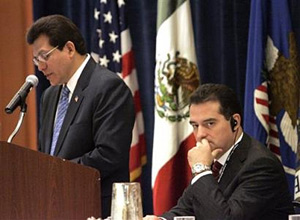 |
 |
 |
 Health & Beauty | May 2006 Health & Beauty | May 2006  
US, Mexico Join to Battle Meth Gangs
 El Universal El Universal


| | U.S. Attorney General Alberto Gonzales, left, speaks as Mexico's Attorney General Daniel Cabeza De Vaca listens during the National Methamphetamine and Chemical Initiative strategy conference in Dallas, Thursday, May 18, 2006. Gonzales and Cabeza De Vaca announced a new partnership between the U.S. and Mexico in fighting meth trafficking. (AP/LM Otero) |
The top prosecutors of both nations reveal plans and tactics to fight the new scourge.

The United States and Mexico have begun working together to battle the methamphetamine problem as production of the cheap and highly addictive drug has moved south of the border, U.S. Attorney General Alberto Gonzales announced this week.

Gonzales, his Mexican counterpart Daniel Cabeza de Vaca and other officials outlined several new cooperative tactics for fighting the drug, including new specialized enforcement teams on both sides of the border.

"We have seen a rise in trafficked meth into this country," Gonzales said during the appearance at a national conference on the drug. "Without the strong American demand for these toxic substances, there would be no incentive for Mexican labs to produce the substance. So we have a lot of work to do here at home."

Tough state legislation and passage of the federal Combat Meth Act have made meth ingredients like pseudoephedrine harder to obtain and shut down numerous labs over the past year, said Karen Tandy, head of the Drug Enforcement Administration (DEA).

Gonzales said much of that production has moved to Mexico, with about 80 percent of the meth distributed in the United States coming from Mexican-run organizations on both sides of the border. He described the groups as mixing corporate sophistication with street-gang violence.

Cabeza de Vaca stressed Mexico´s domestic efforts to target meth suppliers, including port searches, training, treatment for addicts and citizen education.

"Never before have drug traffickers been as severely depleted as they have been in the last five years," he said. "The Mexican government´s strikes have been powerful and frequent."

In addition to the specialized border teams, the two nations announced DEA-led training for 1,000 Mexican police officials on fighting meth. They also announced an agreement to share information among the nations´ drug enforcement agencies and a new bi-national law enforcement working group focusing on the drug.

"For those of us who have been quick to write off any hope of making real headway against drug traffickers in Mexico, today is a new day," Tandy said.

U.S. officials also introduced a planned national listing of properties known to have housed meth labs or dump sites. Owners and renters would have access to the database so they could avoid contamination and illness associated with the toxic residues.

The DEA Academy in Quantico, Virginia, will also establish a new training facility for identifying and targeting secret drug labs this fall, officials announced. | 
 | |
 |



